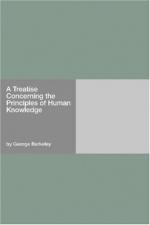And first as to ideas or unthinking things. Our knowledge of these has been very much obscured and confounded, and we have been led into very dangerous errors, by supposing a twofold existence of the objects of sense—the one intelligible or in the mind, the other real and without the mind; whereby unthinking things are thought to have a natural subsistence of their own distinct from being perceived by spirits. This, which, if I mistake not, has been shown to be a most groundless and absurd notion, is the very root of Scepticism; for, so long as men thought that real things subsisted without the mind, and that their knowledge was only so far forth real as it was conformable to real things, it follows they could not be certain they had any real knowledge at all. For how can it be known that the things which are perceived are conformable to those which are not perceived, or exist without the mind?
87. Colour, figure, motion, extension, and the like, considered only as so many sensations in the mind, are perfectly known, there being nothing in them which is not perceived. But, if they are looked on as notes or images, referred to things or archetypes existing without the mind, then are we involved all in scepticism. We see only the appearances, and not the real qualities of things. What may be the extension, figure, or motion of anything really and absolutely, or in itself, it is impossible for us to know, but only the proportion or relation they bear to our senses. Things remaining the same, our ideas vary, and which of them, or even whether any of them at all, represent the true quality really existing in the thing, it is out of our reach to determine. So that, for aught we know, all we see, hear, and feel may be only phantom and vain chimera, and not at all agree with the real things existing in rerum natura. All this scepticism follows from our supposing a difference between things and ideas, and that the former have a subsistence without the mind or unperceived. It were easy to dilate on this subject, and show how the arguments urged by sceptics in all ages depend on the supposition of external objects.
88. If there be external matter, neither the nature nor existence of things can be known.—So long as we attribute a real existence to unthinking things, distinct from their being perceived, it is not only impossible for us to know with evidence the nature of any real unthinking being, but even that it exists. Hence it is that we see philosophers distrust their senses, and doubt of the existence of heaven and earth, of everything they see or feel, even of their own bodies. And, after all their labour and struggle of thought, they are forced to own we cannot attain to any self-evident or demonstrative knowledge of the existence of sensible things. But, all this doubtfulness, which so bewilders and confounds the mind and makes philosophy




